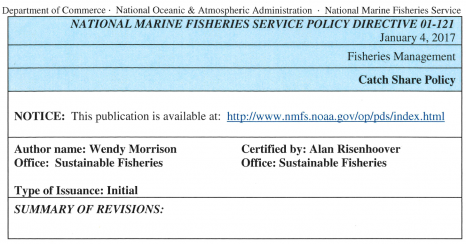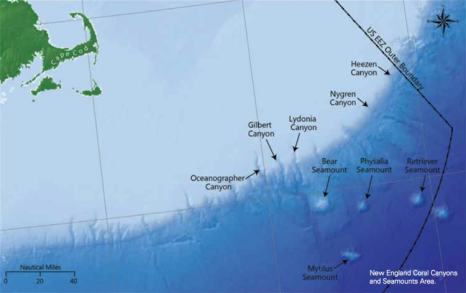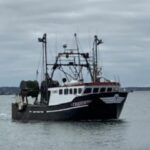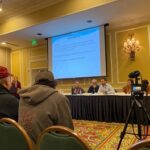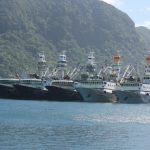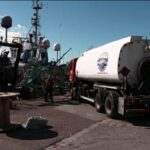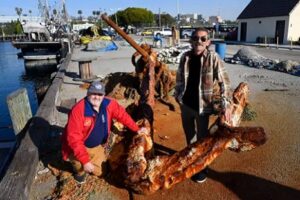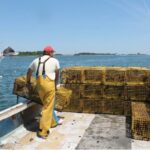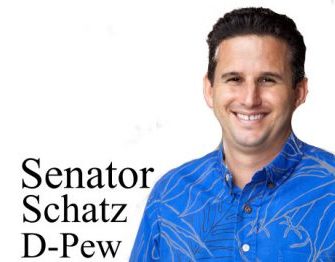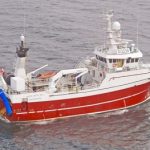Monthly Archives: February 2017
Commerce Secretary Wibur Ross’ side project: Make America first on seafood
 Wilbur Ross is expected to emerge as the Trump administration’s leading voice on trade after the Senate votes tonight to confirm him as Commerce Department secretary. He’s already singled out a surprising pet project: Reducing America’s reliance on seafood imports. “Given the enormity of our coastlines, given the enormity of our freshwater, I would like to try to figure out how we can become much more self-sufficient in fishing and perhaps even a net exporter,” the 79-year-old billionaire businessman said at his confirmation hearing in January. That would be a big job for anyone, since 85 percent, or some $20 billion, of seafood consumed in the U.S. comes from abroad. America is the second-largest seafood market after the 28-nation European Union, and the U.S. seafood industry runs an $11 billion trade deficit. continue reading the rest here 20:39
Wilbur Ross is expected to emerge as the Trump administration’s leading voice on trade after the Senate votes tonight to confirm him as Commerce Department secretary. He’s already singled out a surprising pet project: Reducing America’s reliance on seafood imports. “Given the enormity of our coastlines, given the enormity of our freshwater, I would like to try to figure out how we can become much more self-sufficient in fishing and perhaps even a net exporter,” the 79-year-old billionaire businessman said at his confirmation hearing in January. That would be a big job for anyone, since 85 percent, or some $20 billion, of seafood consumed in the U.S. comes from abroad. America is the second-largest seafood market after the 28-nation European Union, and the U.S. seafood industry runs an $11 billion trade deficit. continue reading the rest here 20:39
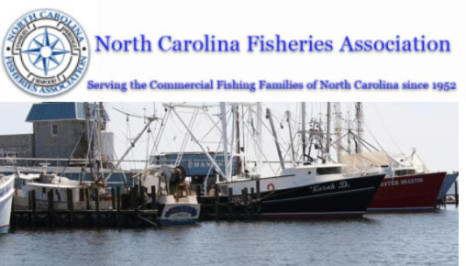
North Carolina Fisheries Association Weekly Update for Februay 27, 2017
Click here to read the Weekly Update, to read all the updates, Click here 17:32
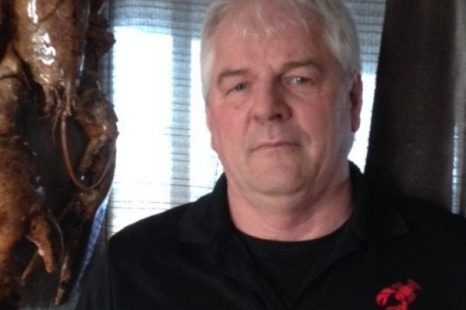
Prince Edward Island Fishermen’s Association names Bobby Jenkins new president
The new president of the Prince Edward Island Fishermen’s Association is entrusting the decision-making responsibilities of the 1,280-member organization in the hands of his board of directors. “You’ve got to work with your board of directors and take your direction from them,” Annandale fisherman Bobby Jenkins said Monday following his weekend election. He takes over from Craig Avery who did not re-offer following two and a half years at the helm. “I congratulated Craig for doing the same thing. I felt Craig took great direction from the board, and I said I don’t intend to do it any differently,” Jenkins said in reference to comments he made to membership during the association’s annual meeting. continue reading the story here 15:35
Next Labour Relations Board hearing on fight between FFAW and FISH-NL set for Thursday
 The Labour Relations Board has another hearing scheduled this week in the ongoing battle to represent inshore fish harvesters in the province. Last week, the board ruled the Federation of Independent Sea Harvesters of Newfoundland and Labrador (FISH-NL) is indeed a legitimate organization after the Fish, Food and Allied Workers (FFAW-Unifor) union had challenged the legality of the group. The board will next decide on whether or not FFAW-Unifor’s membership list of inshore harvesters should be made available to FISH-NL. The number of inshore harvesters is vital in determining whether FISH-NL’s submission of 2,352 signed membership cards meets the 50 per cent required to force a vote by the board to determine who will represent the fishers. Ryan Cleary is urging all harvesters to attend the Thursday hearing. Link 14:52
The Labour Relations Board has another hearing scheduled this week in the ongoing battle to represent inshore fish harvesters in the province. Last week, the board ruled the Federation of Independent Sea Harvesters of Newfoundland and Labrador (FISH-NL) is indeed a legitimate organization after the Fish, Food and Allied Workers (FFAW-Unifor) union had challenged the legality of the group. The board will next decide on whether or not FFAW-Unifor’s membership list of inshore harvesters should be made available to FISH-NL. The number of inshore harvesters is vital in determining whether FISH-NL’s submission of 2,352 signed membership cards meets the 50 per cent required to force a vote by the board to determine who will represent the fishers. Ryan Cleary is urging all harvesters to attend the Thursday hearing. Link 14:52

Farage takes centre-stage in fishers’ Brexit policy launch
Nigel Farage will team up with former UK Government minister Owen Paterson for the launch of Fishing For Leave’s Brexit manifesto in London today. A spokesman for the organisation said it would make clear the “constitutional realities and extrication process” needed to make sure UK control over fishing is “automatically repatriated and not betrayed as negotiating capital a second time”. He added: “This policy advocates a radical new approach of a fit-for-purpose days-at-sea management regime suitable to the UK’s rich highly mixed fisheries. “It ends the cause of the abhorrent practice of mass discarding caused by EU quotas and provides a framework to rejuvenate coastal communities that have suffered so much.” continue reading the article here 13:23
Alaska asks US Supreme Court to overturn decision giving Cook Inlet salmon management to feds
The state is asking the US Supreme Court to overturn an appeals court decision putting the federal government in charge of the salmon fishery in Cook Inlet rather than Alaska. The case began in 2013 when two commercial fishing groups — the United Cook Inlet Drift Association and the Cook Inlet Fishermen’s Fund — sued the National Marine Fisheries Service. They argued that the state had not adequately managed the fishery and that the federal government should exercise more control as designated in the Magnuson-Stevens Fishery Conservation and Management Act. A U.S. District Court judge initially ruled in favor of state management. But in September, the 9th U.S. Circuit Court of Appeals ruled that the federal government — not the state — should exercise management of the Cook Inlet salmon fishery in federal waters. continue reading the story here 12:19
US Supreme Court to overturn an appeals court decision putting the federal government in charge of the salmon fishery in Cook Inlet rather than Alaska. The case began in 2013 when two commercial fishing groups — the United Cook Inlet Drift Association and the Cook Inlet Fishermen’s Fund — sued the National Marine Fisheries Service. They argued that the state had not adequately managed the fishery and that the federal government should exercise more control as designated in the Magnuson-Stevens Fishery Conservation and Management Act. A U.S. District Court judge initially ruled in favor of state management. But in September, the 9th U.S. Circuit Court of Appeals ruled that the federal government — not the state — should exercise management of the Cook Inlet salmon fishery in federal waters. continue reading the story here 12:19
Latest DFO stock assessment unveils a poor outlook for snow crab
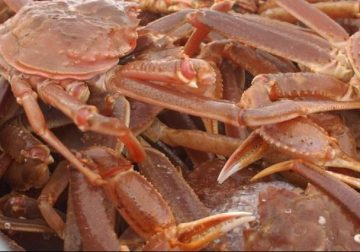 It’s not a pretty picture. In a technical briefing Monday, Darrell Mullowney, lead scientist for snow crab in the NL region for the Department of Fisheries and Oceans (DFO) said the latest stock assessment on snow crab in the Newfoundland and Labrador region shows an overall 40 per cent decline in exploitable biomass from 2015-16. Since 2013, the decline of exploitable biomass has been 80 per cent. Exploitable biomass refers to the crab that are adult, and of legal size — a shell size greater than 95 mm — for commercial fishing. The DFO numbers come from their own trawl surveys — one in fishing zones off the south coast each spring, and the other in northern fishing areas in the fall — as well as from reports from observers on commercial fishing vessels, the log books of the crab fishing fleets, and trap surveys conducted by DFO in inshore areas. The decline in crab stocks, explained Mullowney, is due to two major factors: warming water temperatures and groundfish. continue reading the story here 11:04
It’s not a pretty picture. In a technical briefing Monday, Darrell Mullowney, lead scientist for snow crab in the NL region for the Department of Fisheries and Oceans (DFO) said the latest stock assessment on snow crab in the Newfoundland and Labrador region shows an overall 40 per cent decline in exploitable biomass from 2015-16. Since 2013, the decline of exploitable biomass has been 80 per cent. Exploitable biomass refers to the crab that are adult, and of legal size — a shell size greater than 95 mm — for commercial fishing. The DFO numbers come from their own trawl surveys — one in fishing zones off the south coast each spring, and the other in northern fishing areas in the fall — as well as from reports from observers on commercial fishing vessels, the log books of the crab fishing fleets, and trap surveys conducted by DFO in inshore areas. The decline in crab stocks, explained Mullowney, is due to two major factors: warming water temperatures and groundfish. continue reading the story here 11:04
Federal Court of Canada – Legal challenge threatening autonomy of inshore fishery opens today
 The Federal Court of Canada will begin hearing a test case today in Ottawa that could overturn a decades-old policy that prevents a corporate takeover of inshore fishing licences in Atlantic Canada. The seafood processing industry, inshore fishermen’s groups and the Department of Fisheries and Oceans (DFO) are all watching the case closely, albeit with very different expectations. “The stakes are important because we have seen other fisheries be taken over by corporations and it leaves less money in the hands of individuals and communities,” said Melanie Sonnenberg, president of the Canadian Independent Fish Harvesters Federation. The Federal Court case centres on Kirby Elson, a fisherman from the Labrador community of Cartwright, N.L. Elson was stripped by DFO of his snow crab licence in 2015 when he refused to exit a controlling agreement with fish processor Quinlan Brothers and a related company. Under the 2003 agreement, the company controlled the licence and the wealth it generated. Quinlan Brothers paid the licence fee, provided the vessel and crew, and paid for the insurance and maintenance. continue reading the story here 09:10
The Federal Court of Canada will begin hearing a test case today in Ottawa that could overturn a decades-old policy that prevents a corporate takeover of inshore fishing licences in Atlantic Canada. The seafood processing industry, inshore fishermen’s groups and the Department of Fisheries and Oceans (DFO) are all watching the case closely, albeit with very different expectations. “The stakes are important because we have seen other fisheries be taken over by corporations and it leaves less money in the hands of individuals and communities,” said Melanie Sonnenberg, president of the Canadian Independent Fish Harvesters Federation. The Federal Court case centres on Kirby Elson, a fisherman from the Labrador community of Cartwright, N.L. Elson was stripped by DFO of his snow crab licence in 2015 when he refused to exit a controlling agreement with fish processor Quinlan Brothers and a related company. Under the 2003 agreement, the company controlled the licence and the wealth it generated. Quinlan Brothers paid the licence fee, provided the vessel and crew, and paid for the insurance and maintenance. continue reading the story here 09:10
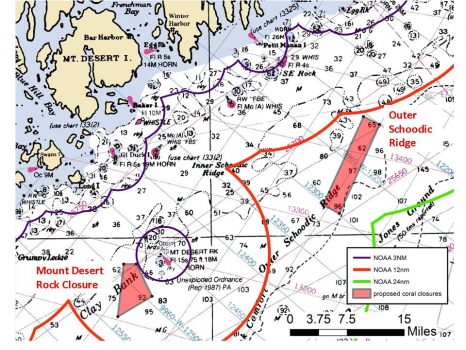
Potential coral protection rules could have big impact on Downeast lobstermen
The New England Fishery Management Council has put rules to protect deep sea corals on the fast track, rules that will have a major impact on lobstermen — primarily from zones A and B with some from Zone C — who set their gear around Mount Desert Rock and Outer Schoodic Ridge. The council is considering management measures to reduce impacts to corals from commercial fishing activities in three areas in the Gulf of Maine. One of the proposals would impose a total ban on fishing in the protected areas which, according to an analysis the Department of Marine Resources submitted to the council several months ago, are located in waters that produce about one-third of Maine’s lobster landings in terms of value. Now DMR is asking lobstermen who fish in the potentially closed areas for information that will help the department in its efforts to prevent the fishing bans. continue reading the article here 08:38
Sierra Club’s claims about Chumash Heritage National Marine Sanctuary are deceptive
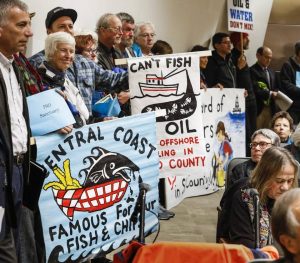 The local Sierra Club and other environmental groups are either ignorant or deceptive when they say the Chumash Heritage National Marine Sanctuary will not have an effect on the local fishing industry. They are asking us to simply “trust them” as they “promise” us that the new sanctuary won’t lead to more regulations on our overburdened fishermen and women. So, if they want us to “trust them,” let’s look at the way similar sanctuary designations have affected fishing industries along the coast. continue reading the op-ed here 08:01
The local Sierra Club and other environmental groups are either ignorant or deceptive when they say the Chumash Heritage National Marine Sanctuary will not have an effect on the local fishing industry. They are asking us to simply “trust them” as they “promise” us that the new sanctuary won’t lead to more regulations on our overburdened fishermen and women. So, if they want us to “trust them,” let’s look at the way similar sanctuary designations have affected fishing industries along the coast. continue reading the op-ed here 08:01
Senate confirms Wilbur Ross as commerce secretary
 Billionaire investor Wilbur Ross won easy Senate confirmation as commerce secretary Monday night, giving President Trump his top trade official who will be charged with leveraging U.S. interests in trade relationships with China and Mexico. Ross was approved in a 72-27 vote.Ross was a key economic adviser during Trump’s campaign who strongly influenced his views on trade, including his opposition to the North American Free Trade Agreement and the now-scrapped Trans-Pacific Partnership deal.,, Trump has said he will rely on Ross to renegotiate NAFTA with Mexico and Canada, a role that would normally be left to the U.S. trade representative. The relatively strong support from Democrats is a response to Ross’s skepticism of major trade deals, which they share. Read the article here 20:31
Billionaire investor Wilbur Ross won easy Senate confirmation as commerce secretary Monday night, giving President Trump his top trade official who will be charged with leveraging U.S. interests in trade relationships with China and Mexico. Ross was approved in a 72-27 vote.Ross was a key economic adviser during Trump’s campaign who strongly influenced his views on trade, including his opposition to the North American Free Trade Agreement and the now-scrapped Trans-Pacific Partnership deal.,, Trump has said he will rely on Ross to renegotiate NAFTA with Mexico and Canada, a role that would normally be left to the U.S. trade representative. The relatively strong support from Democrats is a response to Ross’s skepticism of major trade deals, which they share. Read the article here 20:31
Louisiana’s crab bans spurred by changes in climate and habitat
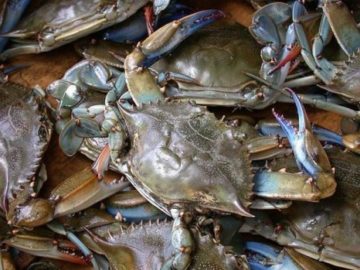 South Louisiana’s blue crab population is on the decline, pummeled by environmental and man-made threats. Increased trapping, less rainfall, no recent hurricanes, wetlands loss, predators, oil spills, closing of the Mississippi River-Gulf Outlet Canal and river-water diversions have taken their tolls. In response, Louisiana’s Wildlife and Fisheries Commission last summer decided to ban crabbing and trap use for thirty days, starting on February 20 of this year.,, The state’s diversions of Mississippi River water to fend off oil from the BP spill, and separately as a way to rebuild wetlands, have pushed crab larvae and babies into the sea where predators loom, Lively said. At this point, it’s unclear which factors are most to blame for a decline in the state’s blue crabs, Jeffrey Marx, LDWF marine biologist and crab program manager, said last week. Less rainfall and ongoing predation on crabs are negatives, he noted. Predators include red and black drum, sea catfish, sheepshead and spotted sea trout. (very interesting) Read the article here 17:47
South Louisiana’s blue crab population is on the decline, pummeled by environmental and man-made threats. Increased trapping, less rainfall, no recent hurricanes, wetlands loss, predators, oil spills, closing of the Mississippi River-Gulf Outlet Canal and river-water diversions have taken their tolls. In response, Louisiana’s Wildlife and Fisheries Commission last summer decided to ban crabbing and trap use for thirty days, starting on February 20 of this year.,, The state’s diversions of Mississippi River water to fend off oil from the BP spill, and separately as a way to rebuild wetlands, have pushed crab larvae and babies into the sea where predators loom, Lively said. At this point, it’s unclear which factors are most to blame for a decline in the state’s blue crabs, Jeffrey Marx, LDWF marine biologist and crab program manager, said last week. Less rainfall and ongoing predation on crabs are negatives, he noted. Predators include red and black drum, sea catfish, sheepshead and spotted sea trout. (very interesting) Read the article here 17:47
Lobster thieves are back at work in Nova Scotia — two fishing boats were hit a week apart.
 RCMP Const. Rob James says the first cache of crustaceans was taken from a boat tied up alongside the wharf in Port Mouton on Feb. 12. Another 135 kilograms was taken in a similar fashion at the same wharf on Feb. 18, bringing the total amount of stolen lobster up to 270 kilograms, worth about $6,000. James says it’s not clear if there’s a connection between the two thefts, and it’s not unusual to see people try to make off with the pricey delicacies. In an incident last January, police say 48 crates of live lobster were stolen from an outdoor pound at a business on Cape Sable Island. The theft followed a similar incident in late 2015, when 14 crates of lobster were stolen from a secure compound on Morris Island near Yarmouth, N.S. Link 15:54
RCMP Const. Rob James says the first cache of crustaceans was taken from a boat tied up alongside the wharf in Port Mouton on Feb. 12. Another 135 kilograms was taken in a similar fashion at the same wharf on Feb. 18, bringing the total amount of stolen lobster up to 270 kilograms, worth about $6,000. James says it’s not clear if there’s a connection between the two thefts, and it’s not unusual to see people try to make off with the pricey delicacies. In an incident last January, police say 48 crates of live lobster were stolen from an outdoor pound at a business on Cape Sable Island. The theft followed a similar incident in late 2015, when 14 crates of lobster were stolen from a secure compound on Morris Island near Yarmouth, N.S. Link 15:54
The Maine Fishermen’s Forum on tap March 2-4 in Rockport
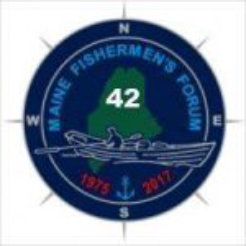 The 42nd annual Maine Fishermen’s Forum is coming up March 2-4 at the Samoset Resort in Rockport. It will feature three days of commercial fishing industry seminars, a trade show, and socializing and networking opportunities. The forum will host fishermen, gear suppliers, scientists, government and other stakeholders to collaborate on all things fishing: markets, resource status, regulations, the latest in technology, the environment and more. Over 120 suppliers of commercial fishing equipment and services exhibit at the forum each year. Continue reading the story here, and visit the Maine Fishermen’s Forum website here 13:10
The 42nd annual Maine Fishermen’s Forum is coming up March 2-4 at the Samoset Resort in Rockport. It will feature three days of commercial fishing industry seminars, a trade show, and socializing and networking opportunities. The forum will host fishermen, gear suppliers, scientists, government and other stakeholders to collaborate on all things fishing: markets, resource status, regulations, the latest in technology, the environment and more. Over 120 suppliers of commercial fishing equipment and services exhibit at the forum each year. Continue reading the story here, and visit the Maine Fishermen’s Forum website here 13:10
Brexit Leak: UK Fishermen May Not Win Waters Back
A leaked memo from the  European Parliament’s Committee on Fisheries looks set to dash the hopes that British fishermen will “win our waters back” as part of Brexit negotiations. This document, as discovered by British newspaper the Guardian, suggests MEPs have drafted seven provisions to be included in Britain’s “exit agreement”, including a stipulation that there will be “no increase to the UK’s share of fishing opportunities for jointly fished stocks”, and instead the existing quota distribution in UK and EU waters will be maintained. The memo also states that “it is difficult to see any alternative to the continued application of the common fisheries policy”. Continue reading the story here 12:18
European Parliament’s Committee on Fisheries looks set to dash the hopes that British fishermen will “win our waters back” as part of Brexit negotiations. This document, as discovered by British newspaper the Guardian, suggests MEPs have drafted seven provisions to be included in Britain’s “exit agreement”, including a stipulation that there will be “no increase to the UK’s share of fishing opportunities for jointly fished stocks”, and instead the existing quota distribution in UK and EU waters will be maintained. The memo also states that “it is difficult to see any alternative to the continued application of the common fisheries policy”. Continue reading the story here 12:18
New Zealand: Underwater life in Kaikoura Canyon marine nature reserve entirely wiped out after earthquake
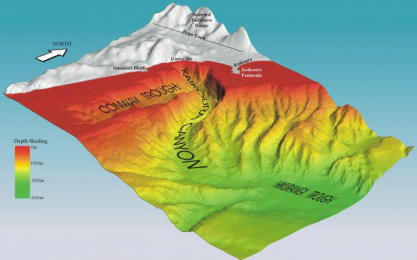 A 7.8 magnitude earthquake in November at Kaikōura, on New Zealand’s South Island, has destroyed all creatures living on the seabed in the Kaikōura Canyon marine nature reserve. On land the earthquake killed two people and caused massive damage to properties, roads and railways. It caused the sea-floor to leap up by two metres in some locations, exposing stretches of sea snails known as paua along the coast. Further out at sea, it caused a mudslide that destroyed a whole ecosystem. “While fish were still found in the area, this time didn’t record evidence of a single organism living on or in the seabed over a stretch of nearly six kilometres. Nothing. It was quite sobering, and a catastrophic event for the ecology of the canyon,” said Dave Bowden, who led a second exploration of the area. Continue reading the story here 10:49
A 7.8 magnitude earthquake in November at Kaikōura, on New Zealand’s South Island, has destroyed all creatures living on the seabed in the Kaikōura Canyon marine nature reserve. On land the earthquake killed two people and caused massive damage to properties, roads and railways. It caused the sea-floor to leap up by two metres in some locations, exposing stretches of sea snails known as paua along the coast. Further out at sea, it caused a mudslide that destroyed a whole ecosystem. “While fish were still found in the area, this time didn’t record evidence of a single organism living on or in the seabed over a stretch of nearly six kilometres. Nothing. It was quite sobering, and a catastrophic event for the ecology of the canyon,” said Dave Bowden, who led a second exploration of the area. Continue reading the story here 10:49
Apalachicola Advocates, Fishermen Continue Fight For Water
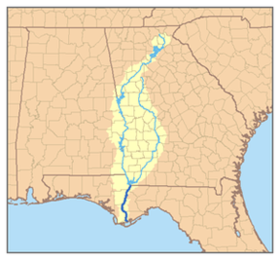 At the end of a river system that feeds booming Atlanta, and farms throughout Georgia and Alabama, sits Apalachicola Bay. The Army Corps of Engineers decides how much water flows here, where the river meets the Gulf. For years, Florida has argued it’s not getting its fair share, and the Bay and surrounding Franklin County are struggling because of it. T.J. Ward is a third generation fisherman who works at his family’s business in downtown Apalach. Over the past ten years, he’s seen the lack of freshwater take its toll, in the form of oyster predators. “One of those are, they call them snails, but we call them oyster drills, the locals do. And they eat oysters. And they’re even cannibalistic, so when they run out of oysters they’ll eat themselves. I mean they’re devastating. That’s one thing that’s killed the end of the bay that our oyster company’s on,” Ward said. Audio report, continue reading the story here 10:15
At the end of a river system that feeds booming Atlanta, and farms throughout Georgia and Alabama, sits Apalachicola Bay. The Army Corps of Engineers decides how much water flows here, where the river meets the Gulf. For years, Florida has argued it’s not getting its fair share, and the Bay and surrounding Franklin County are struggling because of it. T.J. Ward is a third generation fisherman who works at his family’s business in downtown Apalach. Over the past ten years, he’s seen the lack of freshwater take its toll, in the form of oyster predators. “One of those are, they call them snails, but we call them oyster drills, the locals do. And they eat oysters. And they’re even cannibalistic, so when they run out of oysters they’ll eat themselves. I mean they’re devastating. That’s one thing that’s killed the end of the bay that our oyster company’s on,” Ward said. Audio report, continue reading the story here 10:15
Fishy-nomics
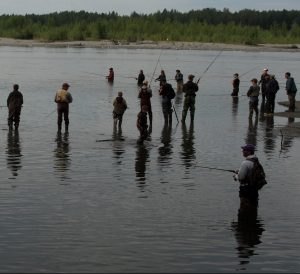 As a blunt reminder of the value of salmon to all Alaskans, businessmen and women from the Matanuska-Susitna Borough paraded before the Alaska Board of Fisheries on Saturday to talk business. Money and jobs have always been the rallying cries of commercial fishermen who catch the majority of salmon that make their way into Cook Inlet, the long fiord at the front door of Anchorage. And government, both state and federal, has long been receptive to their financial pleas. When weak king salmon runs in 2012 forced restrictions that put Kenai Peninsula commercial fishermen on the beach, then Gov. Sean Parnell asked for a federal disaster declaration. When it came, the Peninsula Clarion reported, “an estimated 443 permit holders from Cook Inlet’s eastside setnet fishery” vied for $4.6 million in aid. No government entity, however, has jumped in to bail out Mike Hudson, the owner of 3 Rivers Fly & Tackle in Wasilla, even though his business has in recent years been devastated by weak salmon returns linked in part to how Inlet salmon are managed. continue reading the article here 09:40
As a blunt reminder of the value of salmon to all Alaskans, businessmen and women from the Matanuska-Susitna Borough paraded before the Alaska Board of Fisheries on Saturday to talk business. Money and jobs have always been the rallying cries of commercial fishermen who catch the majority of salmon that make their way into Cook Inlet, the long fiord at the front door of Anchorage. And government, both state and federal, has long been receptive to their financial pleas. When weak king salmon runs in 2012 forced restrictions that put Kenai Peninsula commercial fishermen on the beach, then Gov. Sean Parnell asked for a federal disaster declaration. When it came, the Peninsula Clarion reported, “an estimated 443 permit holders from Cook Inlet’s eastside setnet fishery” vied for $4.6 million in aid. No government entity, however, has jumped in to bail out Mike Hudson, the owner of 3 Rivers Fly & Tackle in Wasilla, even though his business has in recent years been devastated by weak salmon returns linked in part to how Inlet salmon are managed. continue reading the article here 09:40
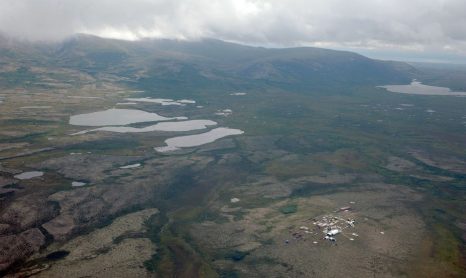
Pebble mine gets no better with time – Danielle Stickman
In early 2006, when George W. Bush occupied in the White House and the Republican Party was firmly in control of Congress, then-CEO of Canadian-based Northern Dynasty Minerals Bruce Jenkins spoke to several communities in Bristol Bay about the company’s plans to construct one of the world’s largest open-pit mines in the middle of the region we have always called home. In his mind, the mine was a done deal. In fact, there was little in the way of consultation or collaboration with the community – Jenkins stated emphatically that Pebble mine would be built. It was just a question of when, not if it would be built. Fast forward 11 years. The GOP once again controls the White House and Congress, promising to open lands to new development and roll back government regulations. Perhaps not surprisingly, a project many believed was dead has been given new life. Some investment blogs and websites are newly bullish on the proposed Pebble project. Northern Dynasty’s current CEO, Ronald Thiessen, is traveling the world to tout Pebble’s prospects, stating the Pebble Limited Partnership, a subsidiary owned and created by Northern Dynasty to develop the mine, will begin permitting this year. Forgive my skepticism about these claims. continue reading the op-ed here 08:59
Ludger Dochtermann of Kodiak – Reinstituting Reasonable Crab Pot Limits
 Dear Board of Fisheries members: My name is Ludger Dochtermann of Kodiak, and I own two crab vessels, the F/V Northpoint and F/V Stormbird. Like all others in the fleet, we are deeply affected by the recent sinking of the F/V Destination off St. George Island and the loss of her entire crew. The Stormbird is also fishing out of St. George this season. It is obvious that icing played a large part in that sinking, and word is that the vessel had an excessive number of pots aboard at the time. Tarps were ripped off and found among the flotsam along with buoys and a life ring. The weather at the time made for severe conditions and risky business. It is challenging to parse between proposals, regulations, and policy, and just plain duty. The IFQ fisheries were instituted for privatization; and a federally imposed IFQ system came into being without NPFMC and U.S. Senate testimonies by vessel architects, load-line engineers, USCG safety officers, insurance experts and experienced captains discussing the specific concerns of safety. Continue reading the letter here 15:54
Dear Board of Fisheries members: My name is Ludger Dochtermann of Kodiak, and I own two crab vessels, the F/V Northpoint and F/V Stormbird. Like all others in the fleet, we are deeply affected by the recent sinking of the F/V Destination off St. George Island and the loss of her entire crew. The Stormbird is also fishing out of St. George this season. It is obvious that icing played a large part in that sinking, and word is that the vessel had an excessive number of pots aboard at the time. Tarps were ripped off and found among the flotsam along with buoys and a life ring. The weather at the time made for severe conditions and risky business. It is challenging to parse between proposals, regulations, and policy, and just plain duty. The IFQ fisheries were instituted for privatization; and a federally imposed IFQ system came into being without NPFMC and U.S. Senate testimonies by vessel architects, load-line engineers, USCG safety officers, insurance experts and experienced captains discussing the specific concerns of safety. Continue reading the letter here 15:54

A Dungeness Dinner – Three recipes that dare to be different!
Oregon’s most valuable seafood is centerpiece of a recent dining experience that’s so easy, anyone can prepare a Dungeness dinner. Last month, we showed you how the Dungeness crab harvest was red hot and rolling as Oregon’s most valuable seafood. Fishermen visited a school to share the good news about seafood that’s worth more than $150 million to the Oregon economy. The program is called “Boat to School” and allows youngsters to learn from Oregon fishermen where seafood comes from – it was an entertaining and informative session, but as it turned out, it was only part of the story. The Oregon Dungeness Crab Commission wants consumers to try recipes that are simple, quick and delicious. Fisherman Steve Fick loves to share that good news with three recipes that dare to be different. Watch the video, view the photo gallery, and copy these three recipes! 12:36

Memorializing a fishing tragedy helps complete a family puzzle — 50 years later
About 200 Islanders gathered in Souris, P.E.I., on Saturday to remember the 10 fishermen who died when their boat Iceland II was grounded in a storm off Cape Breton 50 years ago. For one family, it completed a family puzzle that had been missing a piece all those years. “Out of tragedy, comes some good news today,” said Sandra Hodder Acorn, who was only two months old when her father, Capt. Tom Hodder, went down with the boat. “We’re remembering all the men that went down today and we’re making new connections and finding new family members.” The story goes like this: After the tragedy, Hodder’s mother got remarried to a man named Buddy O’Hanley. He had a son, David, a crewmember who was also killed that day. continue reading the story here 09:46
More restrictions proposed for Northern District setnetters
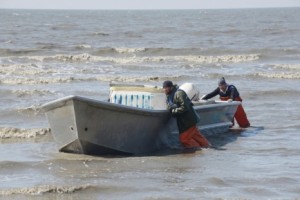 Setnetting on the beaches of northern Cook Inlet isn’t a very visible fishery, but participants argue it’s a viable one. The Northern Cook Inlet setnet fishery operates between a line between Boulder Point in Nikiski and the Kustatan Peninsula on the west side of the inlet and Fire Island. Fishermen can target all five species of Pacific salmon at different times throughout the summer, beginning May 25 with a directed king salmon fishery. As northern district setnetter Trevor Rollman put it in his testimony the Board of Fisheries on Friday, the fishery doesn’t have an official closure, but rather it’s the weather that closes them for the season. Most of the fishermen land in Anchorage. Many of them direct-market their catch, as Rollman said he intended to do with his site in the future. Direct-marketers, sometimes called catcher-sellers, harvest and prepare their catch themselves, selling it directly to customers. Read the full article here 08:57
Setnetting on the beaches of northern Cook Inlet isn’t a very visible fishery, but participants argue it’s a viable one. The Northern Cook Inlet setnet fishery operates between a line between Boulder Point in Nikiski and the Kustatan Peninsula on the west side of the inlet and Fire Island. Fishermen can target all five species of Pacific salmon at different times throughout the summer, beginning May 25 with a directed king salmon fishery. As northern district setnetter Trevor Rollman put it in his testimony the Board of Fisheries on Friday, the fishery doesn’t have an official closure, but rather it’s the weather that closes them for the season. Most of the fishermen land in Anchorage. Many of them direct-market their catch, as Rollman said he intended to do with his site in the future. Direct-marketers, sometimes called catcher-sellers, harvest and prepare their catch themselves, selling it directly to customers. Read the full article here 08:57
Cod an option in face of looming shrimp cuts, says FFAW
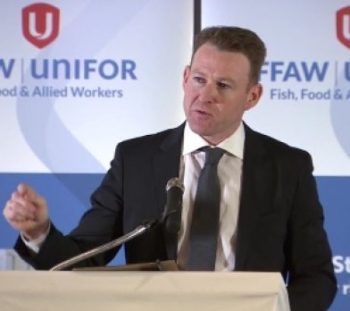 The Fish, Food and Allied Workers union says expansion into commercial cod fishing is a possibility for harvesters, as another cut to overall shrimp quotas looms for next season. Following revelations by the Department of Fisheries and Oceans this week that the shrimp stock in the crucial Zone 6 area off of Newfoundland has fallen again, FFAW president Keith Sullivan says it looks like another quota cut is coming — but there may be alternatives. According to the Department of Fisheries and Oceans, the landed value of shrimp in Newfoundland and Labrador in 2016 dropped to $276 million. Read the story here 08:29
The Fish, Food and Allied Workers union says expansion into commercial cod fishing is a possibility for harvesters, as another cut to overall shrimp quotas looms for next season. Following revelations by the Department of Fisheries and Oceans this week that the shrimp stock in the crucial Zone 6 area off of Newfoundland has fallen again, FFAW president Keith Sullivan says it looks like another quota cut is coming — but there may be alternatives. According to the Department of Fisheries and Oceans, the landed value of shrimp in Newfoundland and Labrador in 2016 dropped to $276 million. Read the story here 08:29
Maine lobstermen’s union votes to buy Hancock County lobster business
 The Maine Lobstering Union voted Saturday to buy a wholesale lobster business near Mount Desert Island to help its fishermen net a bigger share of the profit in the booming, $1.5 billion-a-year industry. At a closed-door meeting in Rockport, members voted 63-1 to buy the wholesale side of the Trenton Bridge Lobster Pound, which includes a tank that can hold up to 180,000 pounds of lobster, for $4 million, said Local 207 President Rocky Alley. “We can’t wait to start buying and selling our own lobsters,” Alley said. “Right now, fishermen sell at the dock, and we get what we get, with no control. But there is lots of money made off lobsters after they leave the dock, and some ought to stay with us fishermen.” The vote enables the Maine union to borrow money from a Kansas City bank and to borrow $1.1 million from fellow locals in the International Association of Machinists and Aerospace Workers as far south as Maryland to purchase the Lamoine-based wholesale business. continue reading the story here 21:36
The Maine Lobstering Union voted Saturday to buy a wholesale lobster business near Mount Desert Island to help its fishermen net a bigger share of the profit in the booming, $1.5 billion-a-year industry. At a closed-door meeting in Rockport, members voted 63-1 to buy the wholesale side of the Trenton Bridge Lobster Pound, which includes a tank that can hold up to 180,000 pounds of lobster, for $4 million, said Local 207 President Rocky Alley. “We can’t wait to start buying and selling our own lobsters,” Alley said. “Right now, fishermen sell at the dock, and we get what we get, with no control. But there is lots of money made off lobsters after they leave the dock, and some ought to stay with us fishermen.” The vote enables the Maine union to borrow money from a Kansas City bank and to borrow $1.1 million from fellow locals in the International Association of Machinists and Aerospace Workers as far south as Maryland to purchase the Lamoine-based wholesale business. continue reading the story here 21:36
Stunned chopper pilot finds castaways lost at sea on two seperate boats from Kiribati
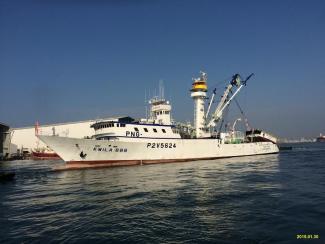 The pilot, operating the chopper from a trawler off the Marshall Islands, came across the boats by chance last week, leading to the rescue of three fishermen and a teenage boy, the Marshall Islands Journal reported. It said both boats had set off from Kiribati, about 650 kilometres (400 miles) away. The one with three fishermen aboard had been adrift for 28 days, while the lone 14-year-old in the other had been lost for 11 days. Ocean currents had brought both boats within eight kilometres of each other but they were unaware of the other’s existence until they were spotted and rescued. The trawler Kwila888 picked up the drifters and cut short its tuna fishing trip to drop them in the Marshalls’ capital Majuro last weekend, the Journal reported. Link 15:53
The pilot, operating the chopper from a trawler off the Marshall Islands, came across the boats by chance last week, leading to the rescue of three fishermen and a teenage boy, the Marshall Islands Journal reported. It said both boats had set off from Kiribati, about 650 kilometres (400 miles) away. The one with three fishermen aboard had been adrift for 28 days, while the lone 14-year-old in the other had been lost for 11 days. Ocean currents had brought both boats within eight kilometres of each other but they were unaware of the other’s existence until they were spotted and rescued. The trawler Kwila888 picked up the drifters and cut short its tuna fishing trip to drop them in the Marshalls’ capital Majuro last weekend, the Journal reported. Link 15:53
Declining worm harvest poses challenge for diggers, scientists
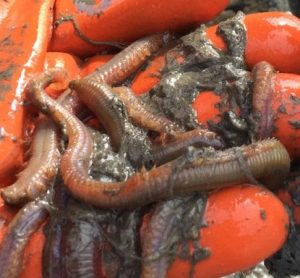 It’s a dirty job, but digging for blood and sand worms along the Maine coast can pay well, particularly in areas of the state where it can be hard to make a living. Maine’s annual harvest of these popular bait worms, however, continues to decline, posing a quandary for marine biologists who cite climate change and predation as possible factors. Wormers, as they’re called, would like to work with marine biologists to ensure a healthy and robust industry.,, Washington County worm diggers have their own theories. “You have biologists that come around, and I’m not taking away from people who go to school, but very few of them say, ‘Well, what do you guys think?’” says Fred Johnson of Steuben, president of the Down East chapter of the Independent Maine Marine Worm Harvesters Association. “They don’t see the changes in that inner benthic zone that we’ve seen over the years,” Bayrd says. Read the story here 14:27
It’s a dirty job, but digging for blood and sand worms along the Maine coast can pay well, particularly in areas of the state where it can be hard to make a living. Maine’s annual harvest of these popular bait worms, however, continues to decline, posing a quandary for marine biologists who cite climate change and predation as possible factors. Wormers, as they’re called, would like to work with marine biologists to ensure a healthy and robust industry.,, Washington County worm diggers have their own theories. “You have biologists that come around, and I’m not taking away from people who go to school, but very few of them say, ‘Well, what do you guys think?’” says Fred Johnson of Steuben, president of the Down East chapter of the Independent Maine Marine Worm Harvesters Association. “They don’t see the changes in that inner benthic zone that we’ve seen over the years,” Bayrd says. Read the story here 14:27
Dream of Offshore U.S. Wind Power May Be Too Ugly for Trump
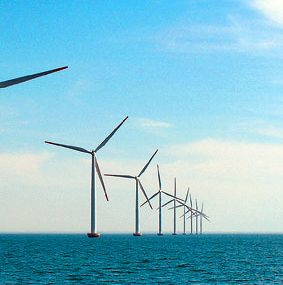 Offshore wind companies have spent years struggling to convince skeptics that the future of U.S. energy should include giant windmills at sea. Their job just got a lot harder with the election of Donald J. Trump. The Republican president — who champions fossil fuels and called climate change a hoax — has mocked wind farms as ugly, overpriced and deadly to birds. His most virulent criticism targeted an 11-turbine offshore project planned near his Scottish golf resort that he derided as “ monstrous.” Companies trying to build in the U.S., including Dong Energy A/S and Statoil ASA, are hoping to change Trump’s mind. They plan to argue that installing Washington Monument-sized turbines along the Atlantic coast will help the president make good on campaign promises by creating thousands of jobs, boosting domestic manufacturing and restoring U.S. energy independence. continue reading the story here 12:47
Offshore wind companies have spent years struggling to convince skeptics that the future of U.S. energy should include giant windmills at sea. Their job just got a lot harder with the election of Donald J. Trump. The Republican president — who champions fossil fuels and called climate change a hoax — has mocked wind farms as ugly, overpriced and deadly to birds. His most virulent criticism targeted an 11-turbine offshore project planned near his Scottish golf resort that he derided as “ monstrous.” Companies trying to build in the U.S., including Dong Energy A/S and Statoil ASA, are hoping to change Trump’s mind. They plan to argue that installing Washington Monument-sized turbines along the Atlantic coast will help the president make good on campaign promises by creating thousands of jobs, boosting domestic manufacturing and restoring U.S. energy independence. continue reading the story here 12:47






